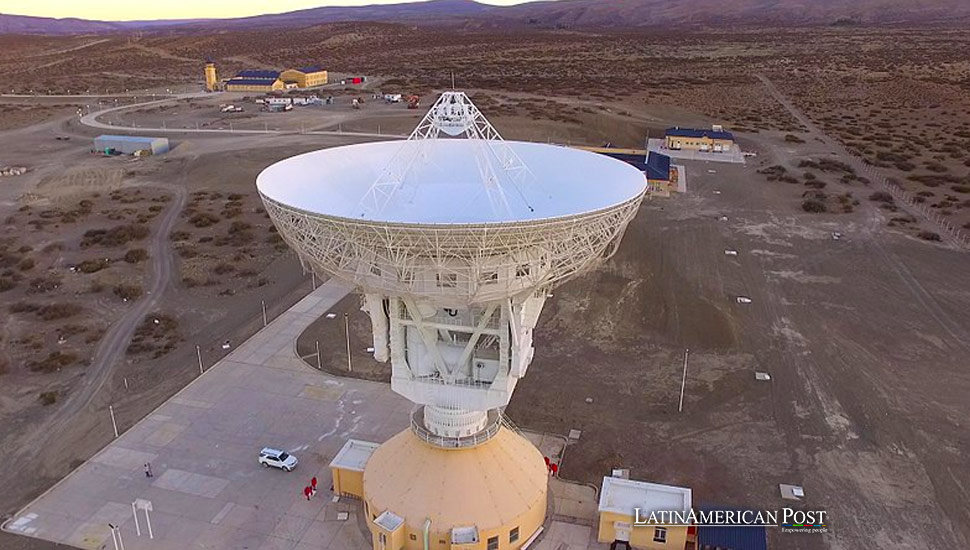Argentina Strengthens Space Ties Amid Global Scrutiny

Amid heightened international scrutiny, the Argentine government has concluded technical visits to space stations in Neuquén and Mendoza, fostering cooperation and quelling concerns over potential military activities by its Chinese partners.
In the latest chapter of Argentina’s ambitious engagement with global space actors, the government of Javier Milei has completed a series of technical inspections at two critical space stations in Neuquén and Mendoza. These visits come at a time when Argentina is strategically positioning itself as a significant player in the space industry amidst international concerns about the dual-use potential of these facilities.
Argentina’s Response to U.S. Concerns
The space station in Neuquén, managed by the China Satellite Launch, Tracking and Control General (CLTC), has been operational since 2017 following a bilateral agreement signed in 2012 under Cristina Fernández de Kirchner’s administration. This station, the only Chinese space facility in the Americas, has recently returned to the spotlight following the visit of U.S. Southern Command’s General Laura Richardson to Argentina. The U.S. has expressed concerns that the station could be used for military purposes rather than purely scientific ones.
In response, the President’s government, which has shown a pro-U.S. alignment in foreign policy matters, announced plans to audit the Chinese station to ensure that no military activities are being conducted there. This move aimed to reassure domestic stakeholders and international partners, particularly the United States. The Chinese government has consistently denied these allegations, stating that the station’s activities are scientific.
Meanwhile, the European Space Agency (ESA) hosted the Argentine delegation at its Deep Space Antenna facility in Mendoza. Known as Antenna DS3, this station has operated since 2013 and is part of a network that includes sister stations in New Norcia, Australia, and Cebreros, Spain. These antennas are crucial for satellite communication with spacecraft in deep space, emphasizing their missions’ scientific and exploratory nature.
Strengthening International Ties
During the visits, Argentine officials, including representatives from the Secretariat of Innovation, Science and Technology, and the National Commission of Space Activities, toured the facilities to understand the ongoing work better. “The visits were an opportunity to strengthen the ties of cooperation with the teams at both space stations,” stated spokespeople from the Cabinet Chief’s Office, highlighting the start of an initiative to increase Argentina’s presence and promote technological exchange at these sites.
The inspections were described as positive and conducted in good terms. The government team reviewed operational status, security measures, and compliance with international standards, ensuring that the stations function within the agreed frameworks.
These visits underscore Argentina’s broader strategy to assert itself as a critical player in the space sector. By hosting facilities from two major space-faring entities—China and Europe—Argentina not only gains technological and scientific benefits but also places itself at a significant geopolitical intersection. This positioning is particularly relevant as nations increasingly view space as a frontier for exploration and strategic competition.
Furthermore, the technical visits and subsequent audits reflect a delicate balance that Argentina must maintain. On the one hand, it needs to foster international partnerships to advance its capabilities and participate in global space endeavors. On the other hand, it must navigate complex global dynamics, especially those involving the United States and China, two of the world’s space superpowers with whom Argentina has significant economic and diplomatic ties.
The successful conduct of these visits and the ongoing dialogue with Chinese and European partners could lead to enhanced collaboration in space technology and research. This opens up new avenues for Argentina in areas such as satellite technology, deep space exploration, and even Earth observation, which are crucial for monitoring environmental changes and natural disasters in a region increasingly affected by climate variability.
Argentina’s Future Role
As Argentina continues to develop its space capabilities, these interactions will likely shape its technological landscape and role on the international stage. The Milei administration’s proactive approach could herald a new era of space cooperation for Argentina, positioning it as a bridge between traditional space powers and emerging actors in the global south.
Also read: Argentina Detains Suspected Jihadist Amid Regional Security Concerns
In Latin America’s larger context, where countries actively seek to expand their technological horizons, Argentina’s endeavors could inspire similar regional initiatives. This could lead to a more integrated approach to space and satellite technology in Latin America, driving regional innovation and cooperation in the final frontier.





